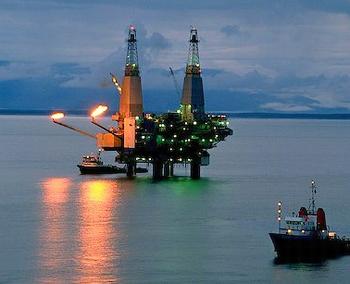 為了讓美國經濟擺脫對化石燃料和外國石油的依賴,美國總統歐巴馬在3月31日宣佈開放開採美國近海的油氣田,同時擁有豐富漁業、觀光業的海岸會受到保護,不予以開採石油或增加鑽探點。
為了讓美國經濟擺脫對化石燃料和外國石油的依賴,美國總統歐巴馬在3月31日宣佈開放開採美國近海的油氣田,同時擁有豐富漁業、觀光業的海岸會受到保護,不予以開採石油或增加鑽探點。
歐巴馬簽署了一份備忘錄,內容是在2017年6月30日收回阿拉斯加布里斯托灣石油與天然氣開租約──包括探勘或開採權;而目前已簽訂的租約則不受此備忘錄影響。
布里斯托灣擁有世界上最豐富的海洋生態系統,近乎一半的美國漁產皆出於布里斯托灣,是世界上最大的野生紅鮭棲息地,也是世界第一的阿拉斯加綠鱈養殖場,另外還產有帝王蟹、大比目魚等等。
「對阿拉斯加海岸的社群、漁業和經濟來說,今天是個值得開心的日子。」阿拉斯加海洋保護會執行長凱莉.哈瑞兒(Kelly Harrell)如此表示。
2007年1月,布希總統脫去布里斯灣的最後一層保護,解除近海鑽探的禁令。這塊曾經被賣掉的560萬畝漁源區,在1989年阿拉斯加外海漏油事件後又被美國政府買回來,目前由美國礦產資源管理局出租至2011年到期。
這份歐巴馬政府3月31日發佈的新能源策略,將主導目前2007-2012年近海油氣租賃政策、甚至即將出爐的2012-2017 年新策略方向。
 「開採我們國土的近海資源可以產生上兆的利潤,此外,除了現今石油及天然氣工業已有的920萬個工作機會外,還能提供上千個新的職缺。」美國石油學會總裁傑克.傑拉得(Jack Gerard)指出。傑拉得同時還在尋求外部大陸棚的油氣鑽探,像是佛羅里達的德司汀峽、太平洋海峽和阿拉斯加。
「開採我們國土的近海資源可以產生上兆的利潤,此外,除了現今石油及天然氣工業已有的920萬個工作機會外,還能提供上千個新的職缺。」美國石油學會總裁傑克.傑拉得(Jack Gerard)指出。傑拉得同時還在尋求外部大陸棚的油氣鑽探,像是佛羅里達的德司汀峽、太平洋海峽和阿拉斯加。
環保團體迅速的對歐巴馬保護布里斯托灣的舉動表示讚賞,但也同時表達對開放新區域油氣田開採的高度關切,擔心大西洋海岸和東墨西哥灣的環境受影響。
野生生物保育者執行長羅傑.史力克森 (Rodger Schlickeisen) 說:「美國政府計畫拓展的鑽探範圍會給海底生態、漁業及海岸經濟帶來危害。」
「維吉尼亞的租約雖然只有北卡羅萊那和崔石比克灣口,但已經讓美國最豐富的海底資源遭受風險,此海底資源是海岸經濟的命脈,觀光業、休閒業和漁業可以帶來十億美金以上的收益。」卡羅萊那南方環境法務中心主任德布.卡特說: 「開放開採南方的大西洋海岸不會對氣候變遷造成改變,也只能提供6個月的油氣用量,卻讓數十億的觀光業、漁業暴露在危險中。只要有一個漏油意外,就可以毀了整個海岸。」
世界自然基金會的北極區與海洋政策副主席比爾.艾斯保(Bill Eichbaum) 則擔心未來波弗特和楚科奇海峽也會開放油氣開採。
美國石油學會的傑拉得則以過去開採石油的安全紀錄向公眾保證石油鑽探安全。
Oil and gas development and exploration on the U.S. Outer Continental Shelf will be expanded to enhance America's energy independence, while protecting fisheries, tourism, and places off U.S. coasts that are "not appropriate" for development, President Barack Obama announced today.
Today President Obama issued a Memorandum withdrawing Bristol Bay from oil and gas leasing through June 30, 2017, whether for exploratory or production purposes. Rights under existing leases in this area are unaffected.
Bristol Bay is one of the world's most productive marine ecosystems. Nearly half of all U.S. seafood is harvested from Bristol Bay, which hosts the largest wild sockeye salmon runs in the world, the world's largest single-species fishery for Alaska pollock, as well as red king crab and halibut fisheries.
"Today is a good day for Alaska's coastal communities, our fishing industry and our economy." said Kelly Harrell, executive director of the Alaska Marine Conservation Council.
In January 2007, President George W. Bush stripped away the last layer of protection for Bristol Bay, the executive ban on offshore drilling. The Minerals Management Service had scheduled a lease sale for 2011 in the same 5.6 million-acre block of fish-rich waters previously sold and then bought back with taxpayer dollars after the Exxon Valdez oil spill.
The new energy strategy announced today will guide the current 2007-2012 offshore oil and gas leasing program, as well as the new 2012-2017 program that this administration will propose.
"Exploring for and developing our nation's offshore resources could help generate more than a trillion dollars in revenues and create thousands of jobs to add to the already 9.2 million jobs supported by today's oil and natural gas industry," said American Petroleum Institute President and CEO Jack Gerard. Gerard is already seeking to open still more of the Outer Continental Shelf to oil and gas drilling, such as the Destin Dome area of the Eastern Gulf and areas off the Pacific Coast and Alaska.
Environmental groups were quick to commend the President for protecting Bristol Bay, but they expressed grave concern that oil and gas development in new areas off the Atlantic coast and in the eastern Gulf of Mexico would harm the environment.
Defenders of Wildlife President and CEO Rodger Schlickeisen said, "The administration's planned expansion of oil drilling risks the health of marine wildlife, fisheries, and coastal economies."
"The Virginia lease sale, just north of North Carolina and at the mouth of the Chesapeake Bay, puts at risk some of America's richest marine life and coastal resources, which are the backbone of many coastal economies, generating billions of dollars in revenues from tourism, recreation, and commercial fishing," said Derb Carter, director, Carolinas Office of the Southern Environmental Law Center. "Opening the South Atlantic Coast to oil and gas drilling will do nothing to address climate change, provide only about six months worth of oil, and put at risk multi-billion dollar tourism and fisheries industries. One oil spill could devastate a coast."
WWF's Vice President for Arctic and Marine Policy Bill Eichbaum is worried that exploratory drilling in the Beaufort and Chukchi seas will be allowed.
Gerard, speaking for the American Petroleum Institute, tried to assure the public that the industry has a good safety record.





